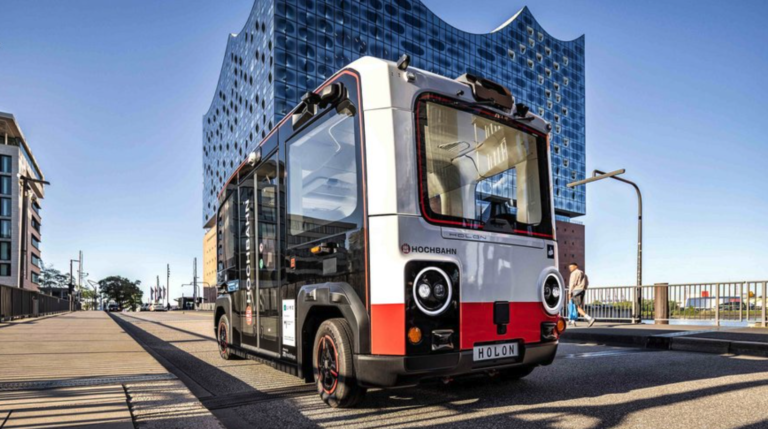The first autonomous Holon Urban vehicle has launched in Hamburg, setting a milestone on the road to autonomous public transportation.
The 5m-long minibus is barrier-free, has space for 15 passengers and can reach 60km/h. The technical test operations will start in late summer from Stadtpark to the Elbe and from Schlump to Wandsbek. The first passengers will be able to board from 2026.
Flavio Friesen, technical manager at Holon, said, “We are very pleased to support [Hamburg transportation company] Hochbahn in implementing its vision of autonomous public transport and to actively shape the future of urban mobility together.”
The Holon Urban will be tested as part of the ALIKE project, which aims to gain insights into the operation and acceptance of autonomous driving services. As well as Holon Urban, Moia’s ID. Buzz AD will be trialled and is already in operation.
In late summer, the new depot for the Holon Urban – the AD Hub – will be opened in Barmbek, around 9km from the center of Hamburg. From there, the minibuses will start their test drives. Until the completion of the AD Hub, the vehicle will be stationed at the Hochbahn depot in Hummelsbüttel.
Robert Henrich, CEO of Hochbahn, said, “The arrival of the first autonomous Holon shuttle marks the beginning of a new phase in public transport for Hochbahn. We want to find out how we can intelligently integrate autonomous vehicles – flexibly and forward-looking – in the interests of our passengers.” In the future, Hochbahn plans to establish regular autonomous driving services.
As part of the test drives in Hamburg, the basic vehicle characteristics will first be tested. Once the test permit for autonomous driving is granted, the driving tasks will be gradually transferred from the driving personnel to the self-driving system. This handover will be based on the progressive maturity of the system and will be gradually expanded over the course of the year so that the vehicle can increasingly act independently.
Anjes Tjarks, senator for transport and mobility transition in Hamburg, commented, “The aim is to work closely with the federal government, our partners and industry and thus to put vehicles into operation that can drive fully autonomously for the first time in the EU. This is the prerequisite for the commissioning of larger fleets and a very important industrial policy issue for Europe.
“With autonomous minibuses like the one from Holon, we want to make public transport even more efficient, even more flexible and thus even more attractive for passengers,” Tjarks added. “People can already apply for a ride next year to experience the future of public transport for themselves in the truest sense of the word.”
After completion of the test phase, a closed group of users will have the opportunity to use Holon Urban next year.


